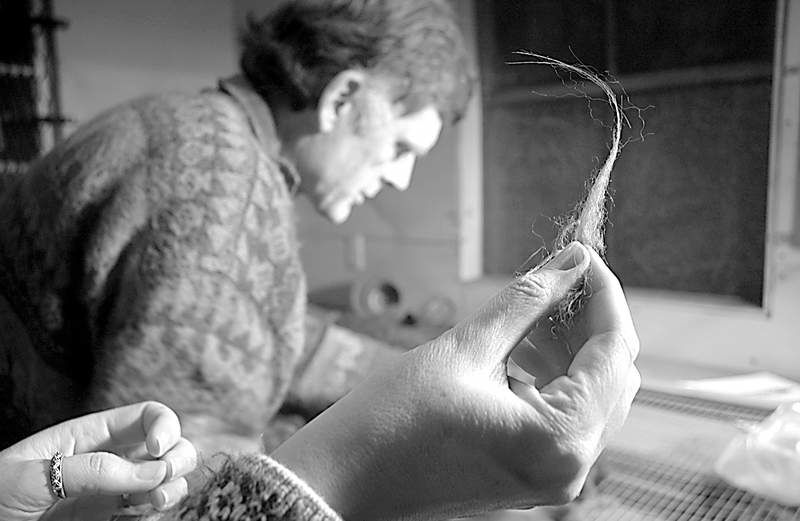Couple’s project focuses on pure alpaca blankets
Published 4:00 am Monday, March 2, 2009

- Carol Lundberg displays a “guard hair,” a strand of alpaca fiber that is coarser, straighter and longer than other locks, as Peter Lundberg sorts through alpaca fiber at their home on a four-acre Stayton farm. Guard hairs are found on an alpaca’s neck, belly and legs. The sorting process eliminates guard hairs, which make the finished product pricklier, the Lundbergs said.
STAYTON — A Stayton couple’s commitment to American-produced pure alpaca fiber products is translating into a thriving endeavor with a nationwide network of contributors.
The Alpaca Blanket Project, the brainchild of Peter and Carol Lundberg of Elderberry Creek Alpacas in Stayton, will produce hundreds of alpaca blankets through the Pendleton Woolen Mills this year. They are using donations of alpaca fiber for the first run of blankets this year, and then will use the list of contributors to buy fiber from in following years.
Trending
The first run of 370 blankets is expected March 13.
Alpacas, cousins of llamas but smaller, produce a fine fiber, similar to cashmere, that was so prized by the Incas that only royalty could have it. The fiber is warm, strong, dry and hypo- allergenic, without the lanolin, or oil, of sheep’s wool.
Because of the consistency of alpaca fiber, many alpaca products, especially blankets, are at most 70 percent alpaca, Peter Lundberg said.
“This is the cutting edge of the fiber industry,” Carol Lundberg added.
The project is already attracting national attention. Peter Lundberg was invited to speak at a national fiber symposium this spring at Gaston College in North Carolina.
Alpacas, sheared once a year, are raised for breeding and to a lesser extent, for fiber.
Trending
‘A turning point’
“The alpaca industry has come to a turning point, where we have to stop focusing so much on show quality,” Carol Lundberg said. “We have to start thinking about what makes these animals so valuable.”
The Lundbergs hand-sort the fiber at their home in Stayton for consistency and color — alpacas come in more than 20 color varieties. Alpaca farmers deliver fiber to about 30 collection points in Oregon, Washington, Cali- fornia, Idaho and Utah.
“It’s all out of pocket now, but we’re seeking grants for help with the transportation issues. That’s been our biggest stumbling block,” Carol Lundberg said.
The Lundbergs’ intent was to keep the fiber process — from the shearing on the farms to the distribution of the final product — entirely in the U.S. The blanket project started in mid-March of last year in the Lundbergs’ basement.
“It got to the point where we couldn’t walk across the floor,” Carol Lundberg said.
Hundreds of pounds of alpaca fiber later, the operation has outgrown the house.
About 175 farms from Maine to Washington contribute fiber, and the project has 250 supporters.
Peter Lundberg spends several hours a day sorting and preparing fiber, and Carol Lundberg takes care of the paperwork. The Lundbergs also spend hundreds of hours online, networking with farms. They maintain a database of about 5,000 alpaca farms across the U.S.
Positive response
Both have day jobs. Carol Lundberg works part time at Santiam Memorial Hospital, and Peter Lundberg works full time for the state as a budget analyst.
The Lundbergs said the response from the industry has been positive, especially from small farms.
“People are so happy about this project. One farm called me and said we should advertise. We said we didn’t have the money. She put an ad in a national magazine for us,” Carol Lundberg said.
It has taken close to five years from concept to implementation for the project to become reality, Peter Lundberg said.
After a successful first season, the Lundbergs hope to supply the Pendleton mill with increasing runs of fiber.
“Here’s a viable business that’s doing extremely well in a downturn economy,” Peter Lundberg said.








